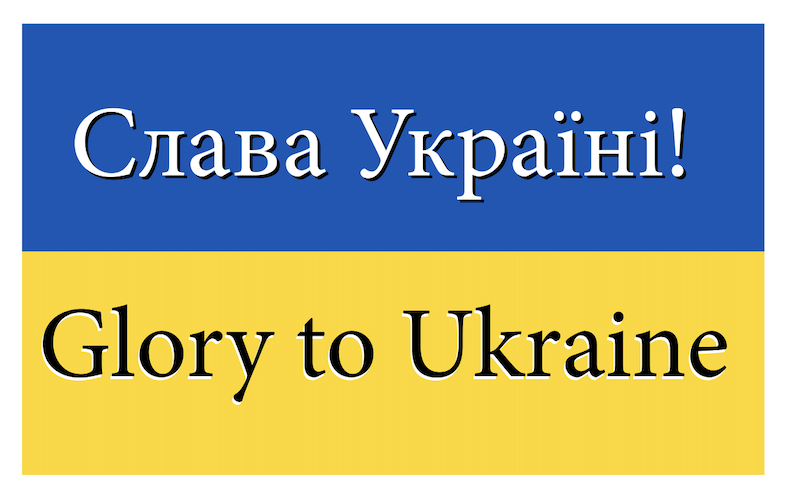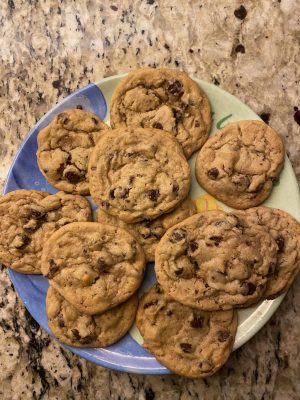In Their Words: Ukrainian Exchange Students on the Russia-Ukrainian War
March 29, 2022
On February 24, 2022 political tensions between Russia and Ukraine came to a head when Russian forces launched an assault of missiles on Ukrainian cities, initiating a present day war. The news was anticipated by many across the world, but for Johnston juniors Iryna Hodun ’23 and Koast Tsymbal ’23, the news was felt deeply as Ukrainian exchange students.
What has being far from your family during such a tragic time been like for you? How are you doing?
Hodun: I read the news because for the last few weeks and months, Russia placed their troops on the borders, so I was kind of watching the situation. And then I saw a lot of messages like explosion, explosion, explosion, and I just started panicking… So then, it was so bad, I couldn’t sleep until 2am. So it was so stressful the first day, the second day— I’m still so stressed, feeling like I can’t help or do anything.
Tsymbal: Before the invasion started, that was fine, I’m kind of an independent person so I don’t really connect to my parents so strongly, so we just had a call only once a week before it started. And, now this is really hard. It’s really hard to hear how your mom is crying … For the first 2 days, I was depressed, I couldn’t do anything. The first day I was crying because my mom was crying, I didn’t know what to do or how to help. It’s just really, really hard.
Hodun is from the Northwest city Rivine. The only shelling that has occurred there has been at the city’s international airport. “My city’s situation is not that bad,” Hodun said as she reflects on how her city’s situation is not as bad as others, but still acknowledges the fear that civilians feel, “When people are asking me like ‘Is your family safe?’ My answer is ‘Nobody’s safe right now” said Hondun.
Tsymbal is from the city Zhytomyr, which is about 200 miles west of the Ukrainian capital, Kyiv. “My friends are scared,” Tsymbal said. “I talked to them, they were like ‘We didn’t know this was going to happen.’ Cities are getting bombed by Russians, we have never provoked them, we have a peaceful country.” As Tsymbal’s friends and family evacuate their country, he watches closely as Russian shelling comprises the safety of his home. “My town was bombed 3 times two days ago (March 2), one time this morning (March 4),” Tsymbal said. “My school got destroyed a little bit, like all the windows broke down.” Despite the danger, Tysmbal’s father has stayed to fight. “My dad, he’s staying really, really strong. He’s helping out the military as much as he can.”
Did you and other Ukrainians anticipate this happening?
H: I did think this would happen because it costs a lot of money to take this whole military to the borders for Russia, and they’re not going to give up just like this, they’re not just going to take it back, so it was predictable.
T: I kind of felt like this was probably going to happen … My mom didn’t think it was going to happen, because the war had already started like 80 years ago, but it was so quiet all the time … I tried to convince them (his family) to leave the country earlier than that, but they were like “Oh, no, we don’t want to.”
What was it like growing up under Russia hovering over your country for so long?
H: During the Orange Revolution, I was in 3rd grade. So my dad actually was in the Orange Revolution, but not in Maidan, so this was after the Orange Revolution. Ukraine had been terrorized by Russia since time even began and we wanted to stay independent and with freedom as a peaceful country. We never started the war, but now they have because they want to create the Soviet Union, have resources, people, and be bigger geographically… I’m just kind of sad that all over the world, everybody’s going to know Ukraine as a country that had a war with Russia. But at least, nobody’s saying right now the phrase “Oh Ukraine, it’s in Russia right?” because when I just came here everyone would ask me this, and now everybody knows it’s not in Russia because we’re at war.
T: To be honest, it didn’t really feel like anything, because I was really young. I didn’t understand what that was like, and it was so far from my hometown. Now I understand what this is like … My parents and my younger brother, he’s 13 years old, it was really, really hard to see them.
Protests of Russian empathizing presidents, policies and an overall fight for sovereignty have swept Ukraine for many decades. Strong advocacy for Ukrainian membership of the European Union, Tsymbal describes differences between Eastern block countries and Western European countries. “For the last couple years we are doing pretty good, we are trying to rebuild our country because of the Soviet Union and all this, we had a lot of corruption in our country,” said Tysmbal. “But the difference is European countries, their infrastructure is way better than our’s.” His love for his country is strong, but he acknowledges the struggles they continue to face as post Soviet States. “They have better salaries, they have really good education… My country is beautiful, it’s really beautiful. I love my country so much, but we have to work on some things to make it better,” said Tsymbal.
How do you feel about Russians compared to how you feel about Putin?
H: Of course the biggest blame is on Putin because he is the dictator and a bad person, but people are guilty too because they didn’t— they just didn’t talk about this. You know, on the internet they say like, #nowar, #ukraineandrussiannowar, etc, and people get so mad because people are dying in Ukraine, and you’re just putting these hashtags on the internet. It’s not helping. You need to all gather up, you need to all go and protest. Only people, only a nation can make something with their government and we can’t do that, we are not Russian people, Putin is not our president. Yes, Russians didn’t choose him, I know, there’s some people that did, but most didn’t. But, if you don’t like him— like we’re telling them, just go and protest, go and be against the Russian government. And they’re like “We can’t, they’re going to take us in a jail.” And we had the same thing, in 2014, and we were protesting, we were fighting. …There are people who think it’s not their (Russians’) fault, I understand them because some people really can’t do anything to help and they are scared for their lives, but at the same time, we are dying right now.
T: I have a few friends from Russia, they’re good people. They’re funny, you have a lot of things in common with them. These are just civilians, they can’t really do anything with that, it’s just— that comes from the top, from the government. That’s a dictatorship. People are scared to walk outside and protest against it, against Putin. And, because they know he might kill them— Putin can send orders to the military to kill all civilians, and nobody would do anything. People are just scared. And I, as everyone in Ukraine hates Putin, I would support that point. Because that’s understandable, civilians are dying.
Are you disappointed by the west’s response (slow sanctions, not enough military aid, etc)? What are your thoughts on this?
H: I don’t really know the NATO situation really good, but I didn’t like their response actually, because we are asking just to close the skies so they couldn’t bomb us from the sky… The only thing people want right now is to just close the skies, it’s a big issue because you can basically just die in your apartment.
T: So Western Europe is trying to do something, the United States is trying to do something, but they are moving so slow… They have to provide all these sanctions way faster because civilians are dying… After Belarus soldiers crossed the border, Western Europe’s reaction was like, “Oh, let’s wait, maybe we’ll provide the same sanctions against Belarus.” But— after they cross the border, that’s war. So you have to provide the sanctions immediately. Everybody’s helping us out a lot, but it must be faster.
With further discussion of foreign relations and how the West can help, Tsymbal and Hodun both remark strongly on the prevalence of propaganda in the war and its significance:
H: We have different spots for donating, we have like a nation bank or something, so you can donate there. But being informed is really important because right now it’s a lot of disinformation, a lot of fakes.
T: They’re (Russia is) saying “No, we’re not shooting civilians, this is all nazis, neonazis.” They’re saying it’s our fault that we are shooting Russians and our civilians, and we are using civilians as a live shield.
H: For my friends and family it’s hard to process fake information because they haven’t slept for a few days, they’re so tired, they just don’t want to go in bomb shelters anymore. So people can support our army with donations, and see on the internet and try to read past the fake information.
T: This is the power of the news. It’s a social media information war, and it’s really hard to control that. It’s really hard to filter all this information. In some ways this is also peoples’ fault because they can go to other sites to look at this information, but no, they’re watching tv and saying “Oh, well Putin says this is true, we have to believe him.” This is not how it should be, people have to double check the information that they get from the news.
As historic tensions unfold before us, both Hodun and Tsymbal assert the war’s importance. Tsymbal considers the global context, “Even if Russia takes over our country, and I hope that’s not going to happen, people need to be aware of him, of Putin, of Putin’s communism. He’s out of his mind already, and he’s threatening the whole entire world with nuclear weapons. It’s going to be like with Germany where he wants more land, he wants more power … he would want to take over all of Europe.”
Hodun says, “I hope that after this, something new can start in our country. We can recreate our country … rebuild people’s mindset. Through this situation, we’ve become more united. It’s just such a bad experience, and it’s so hard when you’re far away from your family and you can’t be with them … A lot of people are dying and have died throughout these past few days, that’s so bad, and these few days can break your heart very fast, and break your hope. But most people hope for the best, and our military is really strong and we believe in them and we help them and donate, and we just stay safe and help.”





